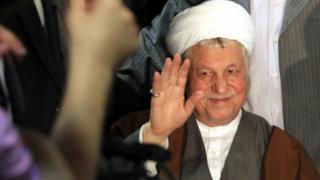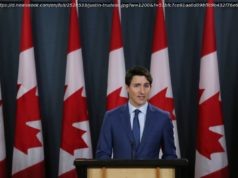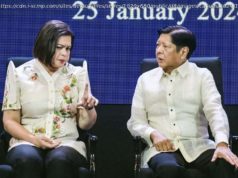 In his death, former President Akbar Hashemi Rafsanjani has quickly become a darling of the Islamic hardliners in Iran.
In his death, former President Akbar Hashemi Rafsanjani has quickly become a darling of the Islamic hardliners in Iran.
Those who missed no opportunity in recent years to denounce his every word and did everything they could to drive him into isolation are now describing him as a pillar of the revolution and a comrade of the supreme leader.
Such is the politics of the Islamic hardliners. They sense a massive collective grief at the death of an influential and popular figure of the Islamic revolution who championed the cause of moderation in recent years.
The hardliners have decided they are better off joining the crowd. They fear they may appear isolated in public opinion, particularly at a time when we are only four months away from the presidential elections.
Hardline newspapers that saw him as a seditious enemy of the revolution have today carried his pictures on their front pages mourning his death.
The Supreme Leader, Ayatollah Ali Khamenei, who at one point would not even take a call from his long-time friend and comrade, will perform the ceremonial prayers over Rafsanjani’s coffin before burial.
The fact is the Islamic hardliners lack popular appeal and electability. Association with Rafsanjani, even now, after his death, could provide a degree of acceptability.
At the same time his death has left a big hole in the confidence of the moderates and the reformist movement in Iran.
The former president was one of the most influential figures of the revolution. He knew the most intimate secrets of 37 years of upheaval in Iran.
Although he began politically as an Islamic hardliner, Rafsanjani had increasingly moved to the centre of Iranian politics in the last two decades, and in recent years, he became a champion of the reformists and a strong moderating influence, gaining huge popularity.
He was in favour of better relations with the West, he was against Iran’s involvement in Syria and he believed he could swiftly mend relations with Saudi Arabia and end the ongoing bloodletting in the region.
At home he was in favour of an economy run by the private sector. He strongly backed the nuclear deal that Iran reached with six world powers – a deal which saw the lifting of international sanctions against Iran in return for the curbing of the country’s nuclear activities.
He believed extremism was eating the fabric of the society from within.
In 2013 when the hardliners barred him from standing as a candidate in the presidential elections, he threw his weight behind Hassan Rouhani, who duly won the elections. Now his death has robbed the reformists of perhaps their most important backer.
But it has to be said that many in Iran have not forgiven Rafsanjani for widespread human rights abuses during his tenure as president and speaker of parliament in the first couple of decades of the revolution.
Many lost their sons, daughters, fathers and mothers to the executioners of the regime that Ayatollah Rafsanjani endorsed and largely led. Memories of this kind are not easily erased, although he moved on to become a voice of reason and compassion in his later years.
But Supreme Leader Ayatollah Khamenei is unlikely to view the death of his long-time rival with relief. Rafsanjani was an agent of continuity as well as a force for the stability for the regime.
Iran has lost a moderating voice at a time when the country remains in flux in the ever intensifying struggle between the moderates and the hardliners.
In these conditions, a big change, such as the sudden absence of a figure like Rafsanjani, who acted as counterweight to the hardliners, could bring with it a period of uncertainty, even instability.






